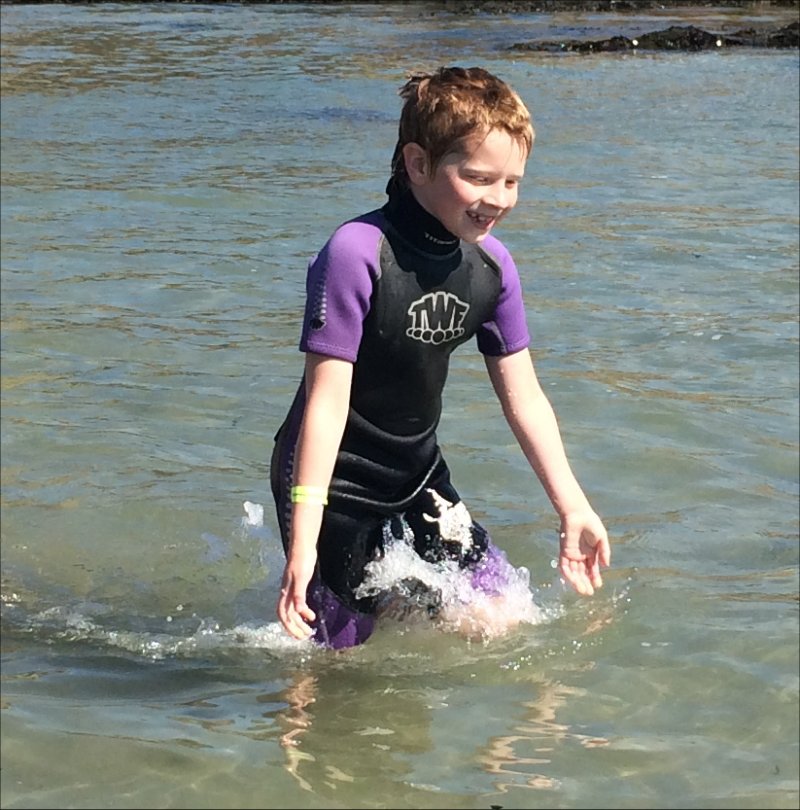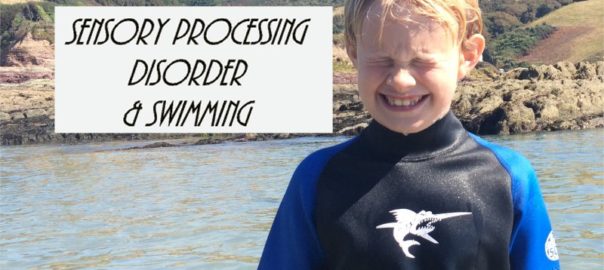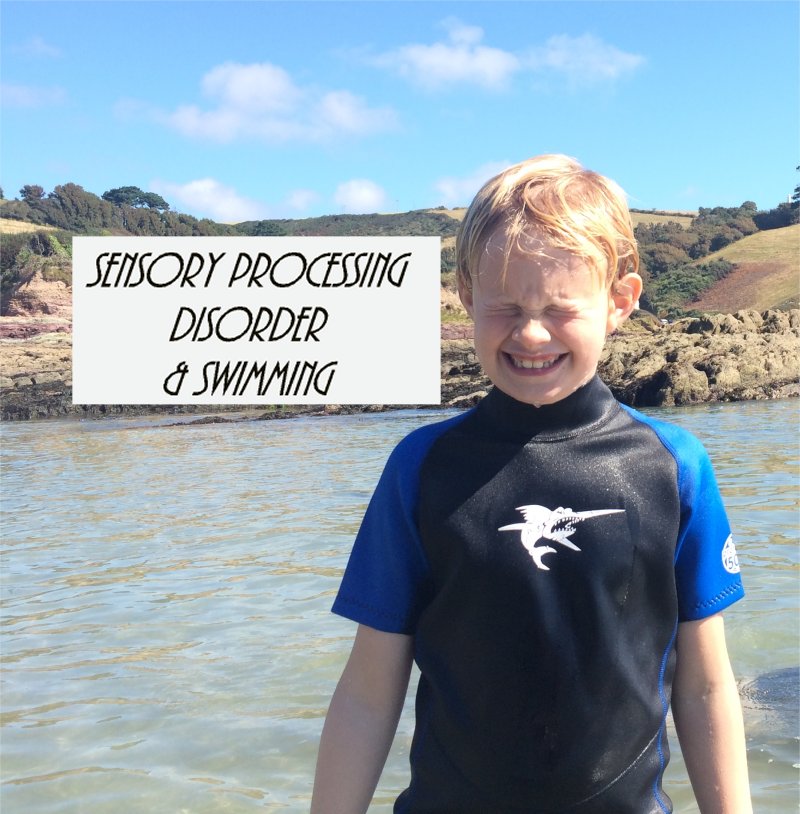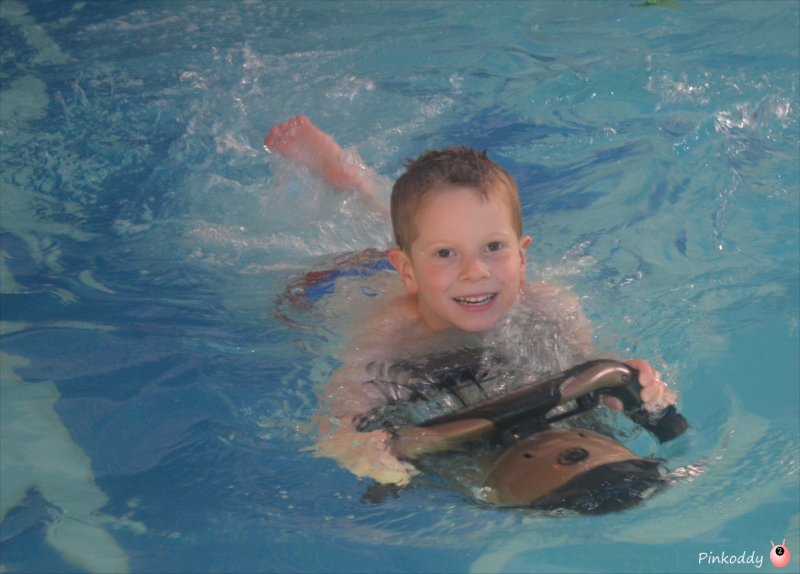Swimming is important for those with Sensory Processing Disorder as they may either be afraid of the water or not aware of the fact they can drowned – and therefore having the ability to swim may save their lives.
Swimming for Development
Swimming is also good for developing fine and gross motor skills/motor planning, attention, listening to instructions, communication, social interaction, group work, and self esteem.
I remember when The Sensory Seeker first went into the pool he loved the feel of the water so much he just tried to keep going as deep as he could (with the poor lifeguard keep bringing him back). It is such a great skill to learn and can be life changing. We have given The Sensory Seeker a mix of group, individual and intensive lessons and he has really come on a long way. And it is not just his swimming that has improved.
Swimming can be in lessons in a pool or the sea, or just family fun. Of course you can help slowly build up in the bath – or swimming could help develop water confidence to go onto the bath or shower!
Swimming and The Auditory Sense (Hearing)
You have to consider whether you are taking a Sensory Seeker or Sensory Avoider. There are going to be lots of sounds and they echo around – both above and below the water. Different times of day, and indeed different days, will have more or less sounds dependent on how busy/popular they are. If you have an Avoider you can buy swimming ear-plugs which may help to block out some of the sounds. Also consider the changing rooms – does the complex have a family change which may be more isolating and quieter?
Wild swimming can make it easier to control this.

Ideally it would be good if pools offered quiet times to swim such as the Relaxed Performances offer, or the Autism Hours that Supermarkets and now offering more and more. Or just to be able to show the individual around so that they can get used to their surrounds/what to expect. The trouble is more and more we are not allowed to take photos of the pools – but check their websites to see if they have any still or video footage of what to expect.
Swimming and The Visual Sense (vision/seeing)
When it comes to the visual sense it depends on where you go. Some pools are literally places to swim with just water and better for Sensory Avoiders. Others can have lots of stimulation including slides, tipping buckets, water spraying out, wave machines, waterfalls, inflatables, toys, Seascooters and so on. Just be aware of how much time you spend there as to whether the individual with Sensory Processing Disorder becomes overstimulated.
Swimming and the Tactile (touch)
I guess the tactile sense could be very problematic if you have a Sensory Avoider – from the touch of the costume to the feel of the water. You may want to consider which is harder for them – the costume or the water – and then decide whether you get one that covers them up (and a swim hat) or one that allows them to be as free as possible (check the pool rules as to whether they can wear “Bermuda style shorts”). They may need to gently become encouraged over time (especially if they are sensitive to the temperature of the water). Overall this may help with other hygiene issues as they get used to the feel of water on their body and overcoming the fear of putting their head under water – which will inevitably help with washing their hair.
Swimming and Proprioception (Sense of body position, from information received through the muscles, and joints – force, speed and control) and Vestibular Sense – Movement and Balance/Gravity

Swimming is good for Proprioception (muscles and joints) body positioning/awareness, movement and balance (vestibular). You may need to consider the other people around you but usually there is plenty of room. For Sensory Seekers pools with lots of slides and action can be great for this – and pools are certainly great places for them to move about a lot! Seascooters are great because it can really pull them along, moving their body right under the water – whilst they retain some control.
Swimming and Olfactory (smell)
The only problem I can think of with smell is the chlorine in the pool (and possibly the smell of other people). Apparently there are certain pools who do not use chlorine if this is a problem.
The Sensory Seeker and Swimming
As I say we have had to try a variety of different types of swimming lesson to help get The Sensory Seeker where he is today. He doesn’t always listen and can be slower than the others (in terms of time to actually swim across and picking it up). But when we consider how far he has come, and how well he is doing it is an amazing difference. Most importantly he can swim pretty well now. He loves the water – especially going underneath. In fact his favourite thing to do is bob up and down under the water vertically (it actually looks like he is drowning and am sure scared many a lifeguard!). At the end of the day we want him to see swimming as a fun activity so also regularly go as a family and actually travel quite far to visit pools with great slides and things to do.



